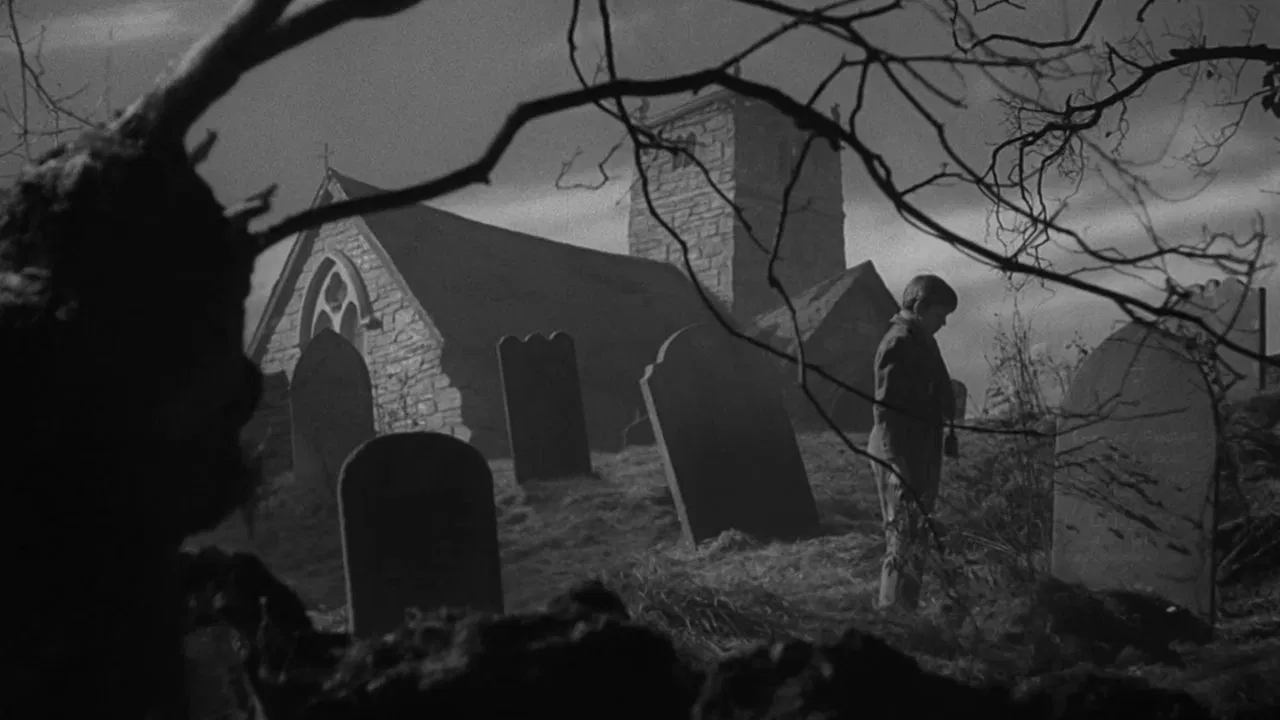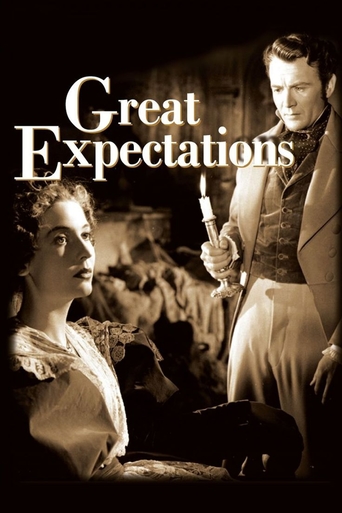

This is a very enjoyable film which follows the novel pretty well.I found the recreation of Victorian England very well done, especially the scenes in Pip's London apartments and Jaggers' offices. The outdoor scenes on the marshes are wonderful and show the strength of black and white in those cases.John Mills grated a little for me, but that's probably just a personal preference and I could never see the attraction in Bernard Miles.All-in-all well worth a viewing.
... View MoreYoung Pip has a hard life: His parents have died, he lives with his shrewish sister, and he's destined to be a lowly blacksmith. Fate smiles on him, however, when a mysterious old lady pays him to play at her estate. It's there he meets the love of his life, the beautiful, but heartless, Estella.This is a great Dickens story, full of emotional ups and downs, following Pip from childhood to adulthood. Tony Wager is endearing as the sweet younger Pip and John Mills is equally sympathetic as adult Pip. Teenaged Jean Simmons is remarkably lovely as the bred-to-be-cruel Estella.The 1946 David Lean movie has many twists and turns and a warm, satisfying ending. Outstanding in every way and a true classic.
... View MoreI read Dicken's novel long before seeing this film and found it to be the masterwork of a great master. I had also seen numerous adaptations of Dicken's works, most of them quite satisfactory, even great, as might well be expected when working from such quality material. I thus settled down to a viewing of David Lean's "Great Expectations" with rather high expectations-pun somewhat intended. My expectations were not high enough, much to my joy, as I found myself experiencing a masterwork in it's own right. To Dickens fans and Lean fans alike, those who have not seen this movie, I can only say that you owe it to yourself to see this film. I echo the sentiments of many of the reviewers here; this film is nearly perfect in every aspect, and reaches an almost transcendent level, taking it's place among other exemplars of high art forms.
... View MoreCharles Dickens made things hard on his cinematic adaptors. "Great Expectations" is a classic example, a flood of vital characters, imposing social themes, and startling coincidences. David Lean took it on by offering a film that works more as a revue of setpieces than unified story, but in those lights, works quite well - most of the time.When we meet Phillip Pirrip, a. k. a. "Pip," he is a boy of 13 wandering the moors near his adopted home in the English country. An escaped convict, Magwitch, makes him promise under duress to bring him file and vittles. Pip does so, his first stand against an unfair social order.In time, he finds himself a victim of that order when he falls for a proud beauty who sneers he is "a common laboring boy." Her adopted mother Miss Havisham, a wealthy hater of men since her own failed attempt at marriage, enjoys the show. Then, suddenly, things take a turn. Pip is given money, lots of it, and the news he is a man of "great expectations" courtesy of an unknown benefactor. Pip thinks he knows who she is.Two things weigh strongly in this film's favor. One is the look and feel. Cinematographer Guy Green and production designed John Bryan give every scene the look of a vintage woodcut by Dickens' illustrator-collaborator George Cruikshank. You feel watching Pip wander the moors or walk the streets of London that you aren't in the real places but inside the book itself.The other major positive is the supporting cast. Even the extras have the right look about them. Reviewers here single out, rightly, the work of Francis L. Sullivan as the officious yet decent and fair lawyer Jaggers, "deep as Australia" and nearly as wide; and Jean Simmons as young Estella, the girl Pip loves. Yet even the smaller parts dazzle, like Pip's mean sister-guardian Mrs. Joe (Freda Jackson) and John Forrest as a most amiable and ineffectual bully named Pocket who grows into the likable Alec Guinness in his first major film role.The big weaknesses, also pointed out by many reviewers here, are the two leads. Valerie Hobson is all wrong as the adult Estella, a part that cried out for the services of her "Kind Hearts And Coronets" costar Joan Greenwood, throaty voice notwithstanding. John Mills shows more skill as the adult Pip, especially in his big revelation scene with his benefactor, but he's miscast, too, a stiff toff even when playing for sympathy. His love scenes with Hobson and the somewhat overplayed Miss Havisham (Martita Hunt) are the film's Achilles heel, sucking up precious oxygen whenever they come up, all the way through to the unsatisfying obtuse finale.Lean and his four assistant screenwriters work hard to keep things tight, a blessing as it allows us to focus on the setpieces, the visuals, and the supporting players as they roll by quickly. There are mistakes, like playing Miss Havisham as a horror-movie character and a silly business in the beginning of Pip hearing accusing voices from cows and dead rabbits after robbing his family larder to feed the convict.Lean did better work on his next Dickens adaptation, "Oliver Twist," but that is because I think it is a stronger story, or at least more easily tightened and less dependent on clanging coincidences than "Great Expectations." Perhaps the many who would disagree with me on the relative merits of the two novels will find this more a classic, and favor it more.What you get here is not a finely-woven yarn but a shimmering mosaic of brilliant jewel-like clusters, not fitting well together but dazzling in their collective display. Lean, despite his detractors, did craft solid stories and not just flashy images in his film work, and there are plenty of examples of that here. Yet the whole is not as great as the majesty of its individual parts.
... View More